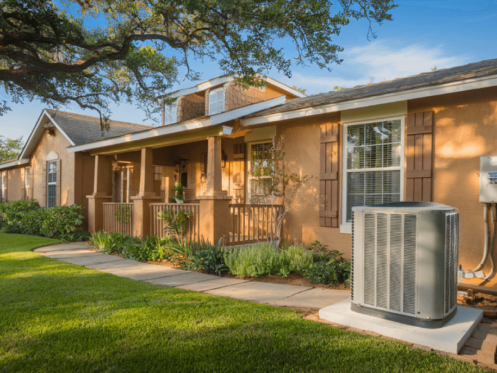Air conditioning is a crucial part of keeping your home comfortable, especially during the hot Texas summers. However, one common problem that can cause discomfort is when AC unit pipes freeze. This issue can greatly reduce how well your home is cooled, leading to discomfort and potential damage to your AC system. It’s important to stop your AC pipes from freezing to keep your home comfortable. For more tips on preventing AC unit freezing, visit Prevent AC Unit Freezing Pipes.
Understanding how air conditioners work can help explain why freezing occurs. Air conditioners cool your home by moving refrigerant through coils, as described in How Do Air Conditioners Work?. When something interferes with this process, such as low refrigerant levels or poor airflow, it can lead to the AC pipes freezing.
Why Do AC Unit Pipes Freeze?
AC unit pipes can freeze for a few reasons. Finding these problems early can stop bigger issues later:
- Low Refrigerant Levels: When the refrigerant level is too low, it can cause the temperature of the evaporator coil to drop below freezing, leading to ice buildup. For more information on how low refrigerant affects your AC, refer to Low AC Refrigerant: 5 Signs and Potential Problems.
- Poor Airflow: Blockages or restrictions in airflow can cause the evaporator coil to freeze. This can happen due to dirty air filters, closed vents, or a malfunctioning blower fan.
- Dirty Coils: Dust and debris on the coils can act as an insulator, preventing proper heat exchange and leading to freezing.
By understanding these common causes, homeowners can take proactive steps to prevent their AC unit pipes from freezing, ensuring their systems run smoothly and efficiently.
Signs of AC Lines Freezing
Spotting the signs of freezing AC lines early can save you trouble later. Here are some common symptoms to watch out for:
- Ice Buildup on Pipes: One of the most obvious signs is visible ice or frost on the pipes of your AC unit.
- Reduced Cooling Efficiency: If your air conditioner isn’t cooling as effectively as it used to, frozen lines might be the culprit.
- Unusual Noises: Unusual sounds like hissing or bubbling from your AC can mean freezing problems.
If you notice any of these signs, it’s crucial to address them promptly to prevent further damage and maintain comfort in your home.
Preventative Measures to Avoid AC Unit Pipes Frozen
Stopping your AC pipes from freezing helps keep your home comfortable and your system lasting longer. Here are some practical tips to keep your AC running smoothly:
- Regular Maintenance: Routine check-ups by a professional can help identify and fix potential problems before they lead to freezing. For more on the importance of maintenance, visit the Department of Energy’s guide on air conditioner maintenance and our Comprehensive AC Maintenance Checklist.
- Proper Insulation: Make sure your pipes are well-insulated to prevent them from getting too cold, which can lead to freezing.
- Ensure Good Airflow: Keep vents and filters clean to allow proper airflow, reducing the risk of freezing. Blocked airflow can lead to the buildup of ice on the coils.
Using these tips can help you avoid frozen AC pipes, keeping your home cool and your system running well.
How to Fix Frozen AC Unit Pipes
If your AC pipes are frozen, act fast to stop more damage. Here’s a step-by-step guide on what to do:
- Turn Off the AC Unit: First, switch off your air conditioning unit. This helps prevent further freezing and allows the ice to start melting.
- Allow the Unit to Thaw: Let the AC unit sit for a few hours to thaw naturally. Avoid using any sharp objects or heat sources to speed up the process, as this can damage the pipes.
- Check for Airflow Obstructions: After thawing, check for blockages. Make sure vents and filters are clean.
- Examine Refrigerant Levels: Low refrigerant can lead to freezing. If you suspect this is the issue, it’s best to call a professional to check and refill the refrigerant safely.
- Restart the Unit: After addressing any issues, restart your AC unit to see if it’s working properly.
If these steps don’t resolve the problem, or if you’re unsure about performing these tasks, it’s wise to seek professional help. An experienced HVAC technician can diagnose and fix the issue effectively.
Professional Help and Services
Getting a professional HVAC service can save time and stop more damage to your AC system. Here are some benefits of professional help:
- Expert Diagnosis: Experts can quickly find the problem and suggest the best solutions.
- Reliable Repairs: Ensure that repairs are done correctly, preventing future issues and extending the lifespan of your AC unit.
- Preventative Maintenance: Regular check-ups can prevent problems before they start, keeping your system running efficiently. Learn more about maintenance at Air Conditioner Maintenance.
- Emergency Services: In case of urgent issues, professionals offer quick response times to restore comfort in your home.
For homeowners in the Greater Austin area and Abilene, Quality Cooling & Heating offers comprehensive HVAC solutions. From routine maintenance to emergency repairs, their team is dedicated to ensuring your home’s comfort and safety. They also provide plumbing services, making them a one-stop solution for your home’s needs.


